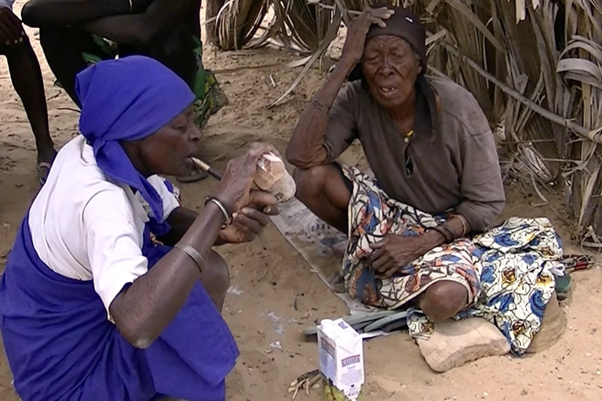Southern Africa holds possibly the greatest human genetic diversity on Earth and new research reveals that diversity is in better shape than had been suspected. When some languages from the Namib Desert died out, anthropologists feared the populations that spoke them had gone too, but new research indicates the people have maintained a genetic identity even without their native tongue.
It is a common pattern that biological diversity is greatest in the place where a species or family originated. Although some non-scientists beg to differ, anthropologists would know humans evolved in Africa even without the fossil record simply by looking at how much greater our diversity is there. This can be seen most dramatically among the inhabitants of the Kalahari and Namib Deserts of south-eastern Africa.
The Namib is a long, thin desert hugging the coast of Namibia and parts of Angola and South Africa. Wars disrupted the northern part for decades and interfered with attempts to study this diversity. Stabilization allowed representatives of the Portuguese-Angolan TwinLab to fill in some of the gaps, identifying patterns in ancient human prehistory in the process.
“We were able to locate groups which were thought to have disappeared more than 50 years ago,” Dr Jorge Rocha of the University of Porto said in a statement. One of these is the Kwepe, who used to speak Kwadi, a language whose disappearance was thought to mark the end of their separation from neighboring populations.
“Kwadi was a click language that shared a common ancestor with the Khoe languages spoken by foragers and herders across southern Africa,” said Dr Ann-Maria Fehn of the Centro de Investigação em Biodiversidade e Recursos Genéticos. As part of the project, the team found two survivors who can remember much of the language living near the mouth of the Kuroka River, whom Fehn was able to interview.

The last two Kwadi speakers, a language thought lost in a population that maintains its genetic distinctiveness
Image Credit: © Jorge Rocha
Using a combination of genetic and linguistic analysis the researchers investigated the relationships between Angolan Namib dwellers. They found the biggest genetic differences between populations with contrasting lifestyles – farmers versus herders versus more traditional hunter-gatherers for example.
Kwadi may be almost gone, but the team found the descendants of those who spoke it retain their genetic distinctiveness that traces back to a time before Bantu-speaking farmers moved into the area.
“A lot of our efforts were placed in understanding how much of this local variation and global eccentricity was caused by genetic drift – a random process that disproportionately affects small populations and by admixtures from vanished populations,” said Dr Sandra Oliverira of the University of Bern.
“Previous studies revealed that foragers from the Kalahari desert descend from an ancestral population who was the first to split from all other extant humans,” added Professor Mark Stoneking of the Max Plank Institute for Evolutionary Anthropology, who pioneered genome-wide studies of southern African desert populations.
“Our results consistently place the newly identified ancestry within the same ancestral lineage but suggest that the Namib-related ancestry diverged from all other southern African ancestries, followed by a split of northern and southern Kalahari ancestries.”
The Angolan Namib and northern areas of Namibia are the only regions where this genetic heritage survives in any numbers.
The research allowed the team to reconstruct the migrations of the region’s populations. The Khoe-Kwadi speakers dispersed across the area around 2,000 years ago, possibly from what is now Tanzania. This makes them relative late-comers compared to the first inhabitants, who spoke Khoe languages and may have been in the area for hundreds of thousands of years. The Bantu speakers arrived 200-500 years late from West and Central Africa.
Khoe language speakers survive in the area, and share ancestry with the more heavily studied Kalahari populations, while the Bantu speakers diverge much less from the rest of humanity. The populations that once spoke Kwadi, before adopting Bantu languages in recent decades, are the missing piece in humanity’s jigsaw identified in this study.
The study is open access in Science Advances.
Source Link: Genetic Studies Rediscover Human Populations In Africa Thought To Be Lost